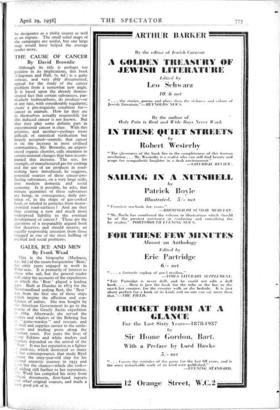THE CAUSE OF CANCER By David Brownlie
Although its title is perhaps too positive in its implications' this book (Chapman and Hall, 75. 6d.) is a quite serious, and very ably documented, appeal for the study of the cancer problem from a somewhat new angle. It is based upon the already demon- strated fact that certain substances, par- ticularly hydrocarbons, do produce—or at any rate, with considerable regularity, create a pre-requisite condition for— cancer in animals. How far they are in themselves actually responsible for this induced cancer is not known. But that they play some definite part in experimental cancer is clear. With this premiss, and another—perhaps more difficult of statistical verification but largely accepted—namely, that cancer is on the increase in most civilised communities, Mr. Brownlie, an experi- enced organic chemist, calls attention to certain national changes that have accom- panied this increase. The use, for example, of manufactured gas for cooking and the use of tar products in road- making have introduced, he suggests, potential sources of these cancer-pro- ducing substances, on a very large scale, into modern domestic and social economy. Is it possible he asks, that minute quantities of these substances are being, in consequence daily par- taken of, in the shape of gas-cooked food, or inhaled in particles from motor- crowded road-surfaces ? And are they thus creating a new and much more widespread liability to the eventual development of cancer ? . These are the questions of a responsibly argued book that deserves, and should receive, an equally responsible attention from those engaged in one of the most baffling of medical and social problems.


























































 Previous page
Previous page